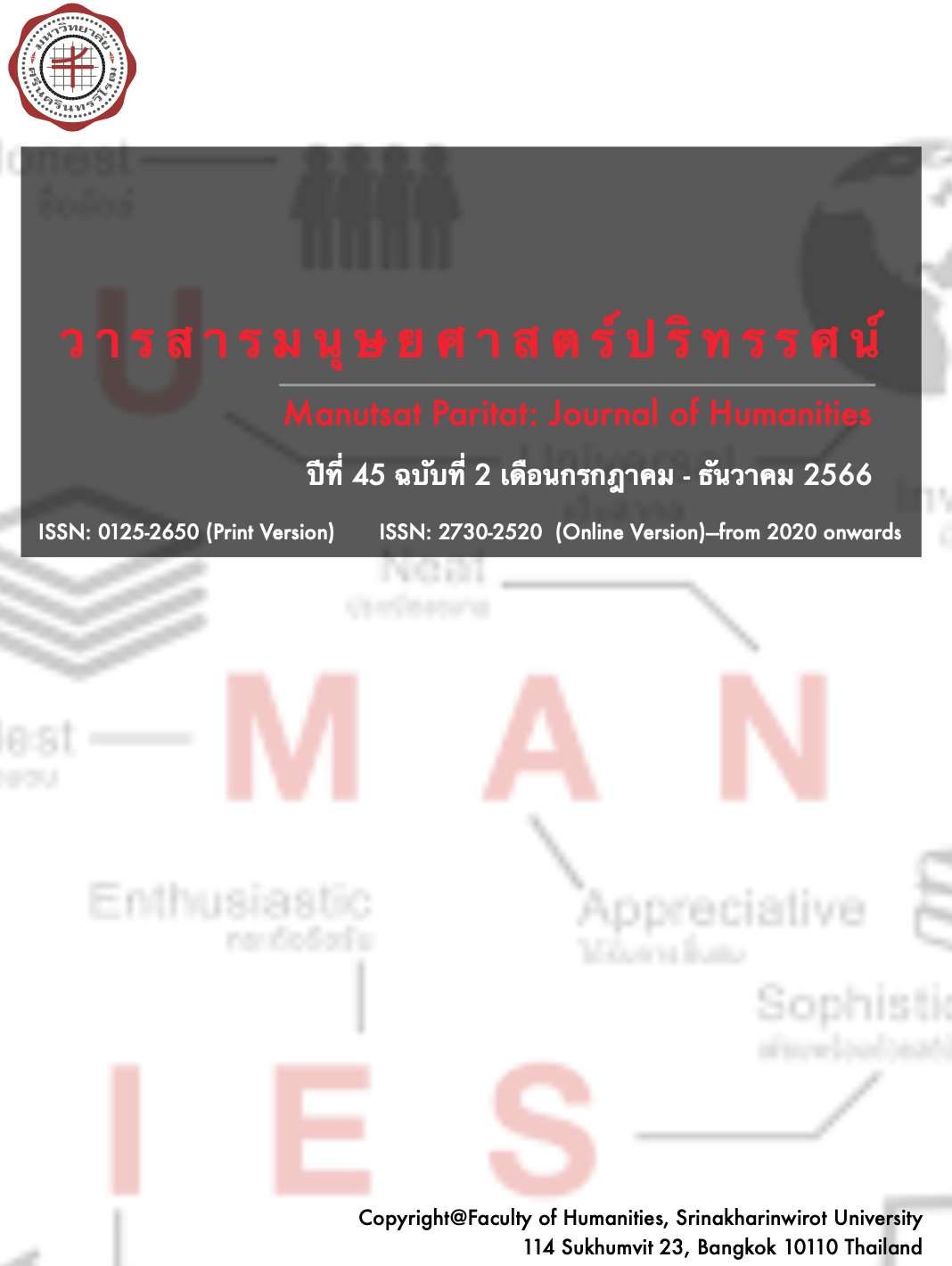Trust Towards Society’s Newcomers
Main Article Content
Abstract
Game theorists argue that trust is the solution to the prisoner’s dilemma. According to many game theorists, trust only arises and results in interactions in condition of reciprocal benefits. If both sides are strangers to each other, it will be harder for trust to arise than if they are acquainted, but this is still possible. If one party is a newcomer and the other is one of the locals, condition of reciprocal benefits may be difficult to achieve. It is because locals generally need not interact with newcomers and have no evidence of trust whether or not the newcomers will harm or betray them, while newcomers need to form relationship with locals to increase their chance of survival and settling down. Thus, the newcomers are more open to trust. When epistemic rationality for one party and practical rationality for the other are in tension, a question arises as to which form of trust can be a basis for cooperative interactions between the two parties. To answer this question, this article examines accounts of trust from game theory, cognitivist theories by Russell Hardin and Berislav Marušić, and non-cognitivist theories of trust by Annette Baier and Karen Jones, respectively. It reaches a conclusion that Jones’ account can be of an answer. Trust seekers have to display their commitments and abilities in response to trust offered, which in turn give trustors the basis for building up their optimism towards the former’s goodwill to an even greater level. This would strike a good balance between epistemic and practical rationality regarding trust for both parties.
Article Details

This work is licensed under a Creative Commons Attribution-NonCommercial-NoDerivatives 4.0 International License.
Any unauthorized copying, publication, reproduction or distribution of copyrighted works appeared in Manutsat Paritat: Journal of Humanities is an infringement of the copyright owners’ rights. To authorize the copying, publication, reproduction or distribution of copyrighted works to be appeared in other printed materials or any online media, please write to MPJHthaijo@gmail.com for permission.
References
Aubert, V. (2006). Competition and dissensus: Two types of conflict and of conflict resolution. In D. Druckman & P. F. Diehl (Eds.), Conflict Resolution (pp. 129-148). Sage Publications.
Axelrod, R. (1984). The evolution of cooperation. Basic Books.
Baier, A. (1986). Trust and antitrust. Ethics, 96(2), 231-60.
Carens, J. (2013). The ethics of immigration. Oxford University Press.
Chignell, A. (2018). The ethics of belief. In E. N. Zalta (Ed.), The Stanford Encyclopedia of Philosophy (Spring 2018 Edition). https://plato.stanford.edu/archives/spr2018/entries/ethics-belief/
Dasgupta, P. (1988). Trust as a commodity. In D. Gambetta (Ed.), Trust: Making and breaking cooperative Relation (pp. 49-72). Blackwell.
Denning, D. E. (1993, August). A new paradigm for trusted systems. Proceedings on the 1992-1993 workshop on New security paradigms (pp. 36-41). USA. https://doi.org/10.1145/283751.283772
Elster, J. (1976). Some conceptual problems in political theory. In B. Barry (Ed.), Power and political theory: Some European perspectives (pp. 245-270). Wiley.
Elster, J. (1979). Ulysses and the sirens: Studies in rationality and irrationality. Cambridge University Press.
Elster, J. (2007). Explaining social behavior. Cambridge University Press.
Frost-Arnold, K. (2014). The cognitive attitude of rational trust. Synthese, 191(9), 1957-1974.
Gambetta, D. (1988). Trust: Making and breaking cooperative relation. Blackwell.
Good, D. (1988). Individuals, interpersonal relations, and trust. In D. Gambetta (Ed.) Trust: Making and breaking cooperative relation (pp. 139-167). Blackwell.
Hardin, R. (1996). Trustworthiness. Ethics, 107, 26-42.
Hardin, R. (2002). Trust and trustworthiness. Russell Sage Foundation.
Hawley, K. (2014). Trust, distrust and commitment. Nous, 48(1), 1-20.
Ho, T. S. (2022). Positive Illusion and the normativity of substantive and structural rationality. Philosophical Explorations. DOI: 10.1080/13869795.2022.2160876
Hofstede, G., & Hofstede, G. J. (2005). Cultures and organizations: Software of the mind, revised and expanded (2nd ed.). McGraw-Hill.
Holton, R. (1994). Deciding to trust, coming to believe. Australasian Journal of Philosophy, 72(1), 63-76.
Jones, K. (1996). Trust as an affective attitude. Ethics, 107, 4–25.
Jones, K. (1999). Second-hand moral knowledge. The Journal of Philosophy, 96(2), 55–78.
Jones, K. (2012). Trustworthiness. Ethics, 123(1), 61-85.
Jones, K. (2019). Trust, distrust, and affective looping. Philosophical Studies, 176(4), 955–968.
Kopec, M., & Titelbaum, M. G. (2015). The Uniqueness thesis. Philosophy Compass, 11(4), 189-200.
Levy, N. (2022). In trust we trust: Epistemic vigilance and responsibility. Social Epistemology, 36(3), 283-298.
Luce, D., & Raiffa, H. (1957). Games and decisions: Introduction and critical survey. Wiley.
Marušić, B. (2015). Evidence and agency: Norms of belief for promising and resolving. Oxford University Press.
Natarajan, S. (2018, November 2). The man who spent decades befriending isolated Sentinelese tribe. BBC News. https://www.bbc.com/news/world-asia-india-46350130
O’Neill, O. (2002). A question of trust: The BBC Reith lectures. Cambridge University Press.
Pandit, T. N., & Chattopadhyay, M. (1989). Meeting the Sentinel islanders: The least known of the Andaman hunter-gatherers. Journal of the Indian Anthropological Society, 24, 169-178.
Pandit, T. N. (1990). The Sentinelese. Seagull Books.
Pettit, P. (1995). The cunning of trust. Philosophy & Public Affairs, 24(3), 202-225.
Pekka, M. (2013). Desire for esteem as reason for trust. In M. Pekka & C. Townley (Eds.), Trust: Analytic and applied perspectives (pp. 119-129). Brill.
Schelling, T. C. (1960). The strategy of conflict. Harvard University Press.
Sen, A. K. (1977a). Rational fools: A critique of the behavioral foundations of economic theory. Philosophy & Public Affairs, 6(4), 317-344.
Sen, A. K. (1977b). Rationality and morality: A reply. Erkenntnis, 11(2), 225-232.
Stalberg, A. (2021, November 12). How Isekai became anime’s most popular genre. Game Rant. https://gamerant.com/how-isekai-genre-became-so-popular/
White, R. (2005). Epistemic permissiveness. Philosophical Perspectives, 19, 445-459.
Williams, B. (1981). Problems of the self. Cambridge University Press.
Winters, B. (1979). Believing at will. Journal of Philosophy, 76(5), 243-256.
Witteloostuijn, A. (2003). A game-theoretic framework of trust. International Studies of Marketing and Organization, 33(3), 53-71.
Worsnip, A. (2018). What is (in)coherence. In R. Shafer-Landau (Ed.), Oxford studies in metaethics 13 (pp. 184-206). Oxford University Press.


